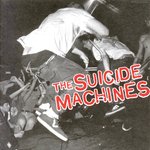


For over a decade, Cale Sauter has been a force in Lansing’s music scene. He co-founded a locally operated indie label, Bermuda Mohawk Productions, was a key member of the city’s most notorious band, the Cartridge Family, and continues to unleash unparalleled metal LPs with Cavalcade. Keep your eyes out for a double LP coming from Cavalcade in 2022, and another “Bermuda Snowhawk” Christmas compilation, which is also coming soon.
Here, Sauter talks up a “gateway” album: “Destruction by Definition” LP by The Suicide Machines. It was spring 1996, he was 15.
How would you describe this album?
Cale Sauter: I’d probably start with the disclaimer that, by contemporary standards, “Destruction by Definition” doesn’t sound as eclectic and experimental as it did when it was less common for more extreme genres to intermingle. I’d also note that some of the lyrics are probably going to sound a lot cooler if you were navigating high school in the late ’90s or early 2000s. Though I will give the Suicide Machines credit for starting to touch on some larger social issues at a time it wasn’t particularly popular for a punk band on a major label to do.
All that said, I find myself still occasionally pulling this record out primarily for the performances, the production and how seamlessly it blended and transitioned in and out of styles and moods. Even as music genres have become more of a melting pot, very few records exist even today that manage to take me on such an exhilarating and unpredictable ride while still being perfectly balanced and sequenced. This came at the outset of a musical era that would deliver a lot of genre cross-pollinating that sounded pretty awkward, so the tight and natural sounding execution of it on “Destruction” stood out for years.
Who introduced you to The Suicide Machines?
Oddly enough, the Detroit Free Press used to have this 1-800 number where they’d have a sample of music by an artist they’d recently covered or reviewed. Dr. Kevorkian was in the news quite a bit at the time for his advocacy of euthanasia for the terminally ill via the “suicide machine” he had created. From an article about him, I learned a Detroit band had sprouted up that called themselves Jack Kevorkian & the Suicide Machines. They eventually dropped the “Jack Kevorkian &” in their name, but I recognized them when the Detroit Free Press covered their debut full-length, “Destruction by Definition.” I checked it out and called the 800 number for the music sample — what a weird brief moment in “technology.”
What were your initial thoughts on the CD?
After hearing the band cycle through just about every different type of outsider rock sub-genre that was hitting with people my age, punk, metal, hardcore and ska, over the span of a one-minute sound clip, I was on board to track down the record when it came out. I was floored that I didn’t have to look far. The band had signed with Hollywood Records and, with the benefit of major label distribution, I was actually able to find the CD in the music section of the Adrian Meijer. To my 15-year-old ears, it delivered on all of the eclectic promise of that sound clip, and more.
After the first listen of the CD, what stood out the most?
At the time, I was enamored with what I guess would now be considered the “second golden age” of hip-hop. As things started getting glossier across that genre in the latter half of the ’90s, I started gravitating toward some of the grittier and more eclectic rock that was breaking through. In spite of that, I wasn’t really sure what to make of the punk and third-wave ska revivals cropping up prior to this record. The Billboard Charts examples of ’90s punk I was exposed to living in the middle of nowhere seemed a bit more cheery or poppy than I was really feeling. The Suicide Machines, however, applied a sort of “Detroit grit” to the formula that bridged the gap for me.
In what ways has this album directly affected your life?
It’s impossible to overlook how seeing this Detroit band with DIY punk roots, made up of people only 3 to 7 years older than me, defined or redefined what I thought the ceiling was for starting your own band in the Midwest. Detroit was really in a phase between musical identities at the time and I hadn’t really seen any young Michigan artists break out on an international scale, or national scale for that matter, in my young life.
Most of the music I make or have made hasn’t really sounded much like this album. At a philosophical level though, it influenced me tremendously as far as not shying away from disparate musical influences or experimental instrumentation ideas; not to mention giving me the confidence to dive headlong into DIY punk, booking shows — including The Suicide Machines, eventually — and releasing records independently.
Cale Sauter’s Honorable mentions:
“Hearing Our Own Wars,” by Small Brown Bike
“Stately Chaos Home,” by Inside Five Minutes
Support City Pulse - Donate Today!
Comments
No comments on this item Please log in to comment by clicking here